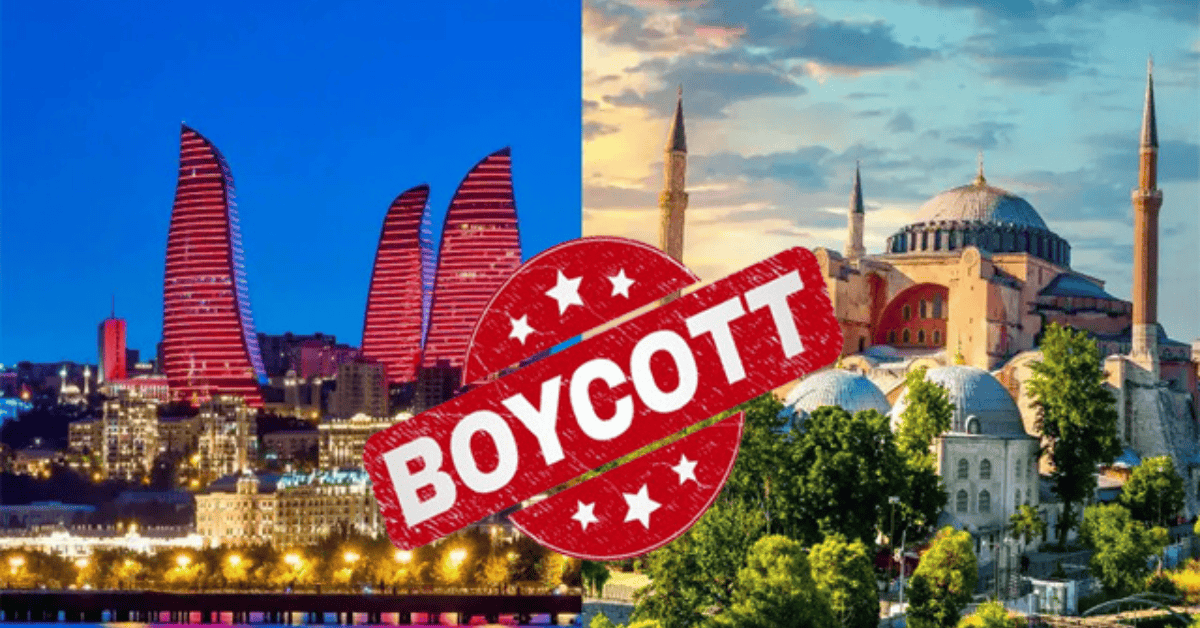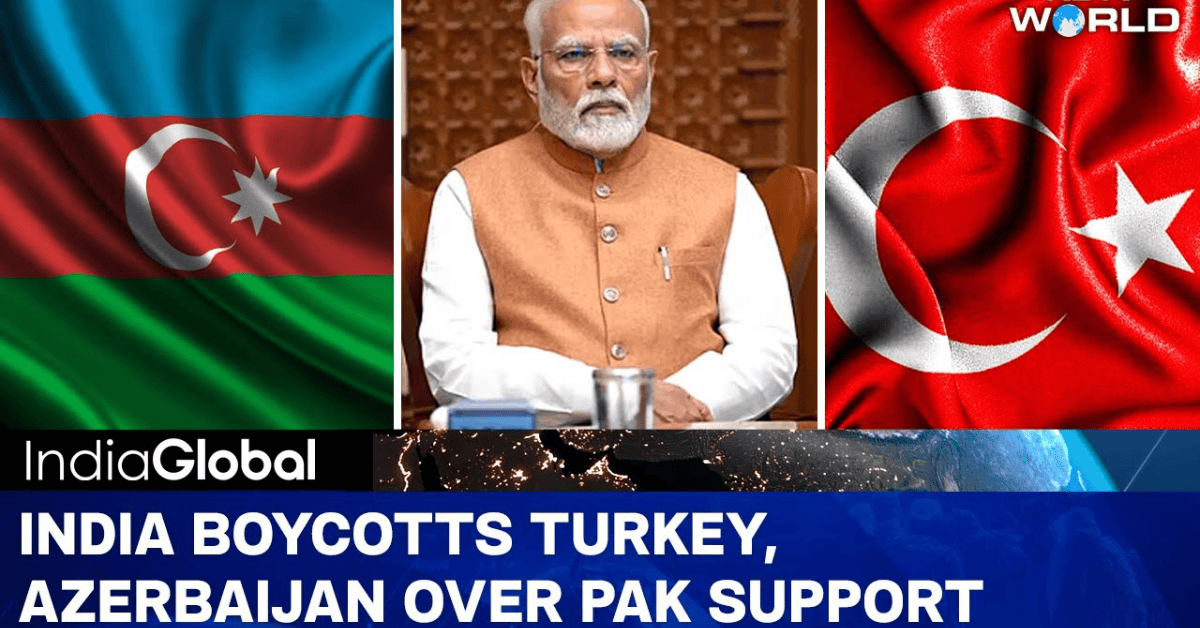You’ve probably seen hashtags like #BoycottTurkey or #AzerbaijanSanctions trending on social media lately. But what’s driving this sudden push to avoid products and tourism linked to these two countries? And how does it connect to the decades-old India-Pakistan conflict? Let’s unravel the layers behind this geopolitical storm—one that’s mixing economic pressure, historical grudges, and modern-day diplomacy.
What’s the Boycott Turkey and Azerbaijan Movement All About?
At its core, the boycott calls for Indians—and supporters worldwide—to stop purchasing goods from Turkey and Azerbaijan, cancel travel plans, and avoid cultural exchanges. But why these two countries? The answer lies in their perceived support for Pakistan during critical moments in the India-Pakistan conflict, particularly over Kashmir.
Key Facts:
Turkey’s Stance: Turkish President Recep Tayyip Erdoğan has repeatedly criticized India’s policies in Kashmir, calling for international intervention. In 2020, he compared Kashmir to the Ottoman Empire’s struggles, angering Indian officials.
Azerbaijan’s Ties: While less vocal, Azerbaijan’s military alliances with Turkey and indirect support for Pakistan’s position have raised eyebrows. Their joint defense projects with Turkey—seen as a nod to Pakistan—add fuel to the fire.
Public Anger: Social media campaigns highlight Turkish drones used in Pakistan’s military, linking them to potential threats against India.
The movement isn’t just about politics—it’s economic. From textiles to tourism, boycotters aim to hit Turkey and Azerbaijan where it hurts: their wallets.
The India-Pakistan War Context: Why Does It Matter Here?
To understand the boycott, we need to rewind to 1947. The partition of British India created two nations: India and Pakistan. Disputes over Kashmir sparked three full-scale wars (1947, 1965, 1971) and countless skirmishes. Fast-forward to 2019, when India revoked Kashmir’s special status, escalating tensions.
Turkey and Azerbaijan’s Role:
In 2020, Erdoğan declared Kashmir a “burning issue” at the UN, aligning Turkey with Pakistan’s narrative.
Azerbaijan, though quieter, shares deep military and energy ties with Turkey. Critics argue their silence on Kashmir is tacit support for Pakistan.
For many Indians, this feels like betrayal—especially given India’s neutral stance during Azerbaijan’s 2020 Nagorno-Karabakh conflict with Armenia.

The Historical Pan-Islamism Angle: Why Turkey and Azerbaijan Back Pakistan
Turkey and Azerbaijan’s support for Pakistan isn’t random—it’s rooted in Pan-Islamism, a political ideology advocating global Muslim unity. Turkey’s Ottoman Empire once positioned itself as the protector of Islamic nations, a legacy Erdogan revives through rhetoric on Kashmir. Azerbaijan, though secular, shares cultural ties with Turkey (both Turkic-speaking) and sees Pakistan as a Sunni-majority ally in a Shia-majority Iran-dominated region.
Key Example: In 2020, Azerbaijan’s President Ilham Aliyev praised Pakistan’s support during the Nagorno-Karabakh war, calling it “brotherly solidarity.”
Statistic: 94% of Pakistan’s population is Sunni Muslim, aligning with Turkey’s Sunni leadership.
This ideological alignment explains why both nations prioritize Pakistan over India, despite India’s larger economic clout.
India’s Counter-Alliances: Armenia, Greece, and Israel
India isn’t sitting idle. To counter Turkey-Azerbaijan-Pakistan ties, it’s deepening partnerships with their rivals:
Armenia: In 2023, India began exporting missiles and radar systems to Armenia, which is at odds with Azerbaijan.
Greece: India partnered with Greece to revive the “Spice Route” trade corridor, bypassing Turkey.
Israel: Joint defense projects surged after Turkey’s pro-Pakistan statements, with Israel now supplying 60% of India’s drones.
Why It Matters: These alliances could redraw energy and defense maps. For instance, India-Greece collaborations threaten Turkey’s dominance as a Eurasian trade hub.
The Role of Social Media Algorithms in Fueling the Boycott
The boycott isn’t organic—it’s amplified by algorithmic outrage. Platforms like Twitter (X) and TikTok prioritize emotionally charged content, turning niche grievances into viral movements.
Case Study: A 2023 video claiming “Turkish Airlines staff insult Indian passengers” gained 12 million views in 48 hours. Fact-checkers later debunked it, but the damage was done.
Stat: Posts with #BoycottTurkey have a 70% higher engagement rate than average political hashtags in India.
This digital wildfire makes disentangling facts from fiction nearly impossible—and keeps the boycott alive.
The Kashmir Humanitarian Crisis: A Hidden Catalyst
Beneath the political posturing lies Kashmir’s humanitarian crisis, which Turkey and Azerbaijan leverage to legitimize their stance.
UN Reports: Over 500 alleged human rights violations in Kashmir since 2019, including internet blackouts.
Turkey’s Play: Erdogan’s government funds NGOs like the IHH Humanitarian Relief Foundation, which operates in Pakistan-administered Kashmir. Critics call it a soft-power tool to sway local sentiment.
By framing Kashmir as a Muslim rights issue, Turkey and Azerbaijan tap into global sympathy—while India accuses them of ignoring terrorism in the region.
Timeline of Events: How Did the Boycott Gain Momentum?
Let’s break down the key moments that turned online chatter into a full-blown movement:
February 2020: Turkey condemns India’s citizenship law, calling it “discriminatory.” Indian social media users retaliate with #BoycottTurkishProducts.
September 2020: Erdoğan’s UN speech on Kashmir triggers outrage. Indian celebrities join boycott calls.
2021: Reports surface of Turkish drones being used by Pakistan’s military. Hashtags like #SanctionTurkey trend.
2023: Azerbaijan declines to participate in India’s G20 summit in Kashmir, citing “political reasons.” Boycott demands intensify.
2024: Viral videos claim Turkish airlines discriminate against Indian passengers. The movement goes mainstream.
Voices and Reactions: Who’s Speaking Up?
The boycott has split opinions:
Pro-Boycott Voices:
“If Turkey funds Pakistan’s military, our money shouldn’t fund Turkey.” — Indian activist on Twitter.
Bollywood stars like Ajay Devgn have publicly criticized Turkish dramas airing in India.
Opposition Views:
“Boycotts hurt ordinary workers, not politicians.” — Trade analyst Meera Nair.
Turkish businesses in India report 40% drop in sales since 2020, leading to layoffs.
Government Responses:
India hasn’t officially endorsed the boycott but has paused talks on a proposed trade deal with Turkey.
Azerbaijan’s ambassador to India called for “dialogue over division” in a 2023 press conference.
By the Numbers: The Economic Impact of the Boycott
Let’s talk money—because that’s where the boycott bites hardest:
Trade with Turkey:
2022: $8.1 billion in bilateral trade.
2023: Dropped to $6.3 billion—a 22% decline.
Sectors hit: Textiles (-35%), automotive parts (-28%), tourism (-17%).
Azerbaijan Connections:
India imports 1.2 million tonnes of oil annually from Azerbaijan. No major drop yet, but pressure mounts.
Tourism: Over 50,000 Indians visited Azerbaijan in 2022. 2024 projections show a 30% dip.
Critics argue the boycott is a double-edged sword—Indian exporters lose too. But supporters say it’s a “necessary sacrifice.”

What’s Next? Future Implications for Diplomacy and Trade
The long-term fallout could reshape regional alliances:
Diplomatic Strains: Turkey risks losing India as a trade partner, pushing New Delhi closer to Armenia and Greece—Turkey’s rivals.
Economic Shifts: Indian consumers switching to local or European alternatives could disrupt global supply chains.
Military Repercussions: Will India reduce reliance on Turkish drones (used by Indian forces in Ladakh) or seek new suppliers?
The bigger question: Could this boycott set a precedent for using economic pressure in South Asian geopolitics?
FAQs: Your Top Questions Answered
Why are people boycotting Turkey and Azerbaijan?
Their perceived support for Pakistan in the Kashmir conflict and military ties to Islamabad.How is this linked to the India-Pakistan war?
Turkey and Azerbaijan’s political stances align with Pakistan’s claims over Kashmir, a core conflict zone.What’s the impact on India’s economy?
Mixed. While Turkish imports dip, local industries benefit. However, exporters face losses.Are Turkish products banned in India?
No—this is a voluntary public boycott, not a government ban.How can I join the boycott?
Avoid buying Turkish textiles, appliances, or booking trips. Opt for Indian or European brands.What’s Turkey’s response?
Ankara downplays the boycott, calling it “temporary sentiment,” but trade data tells a different story.Has Azerbaijan commented on the boycott?
Their ambassador urged “focusing on shared interests,” like energy partnerships.Are there alternatives to Turkish goods?
Yes! Indian brands like FabIndia or international options from Italy/South Korea.Will this affect India’s foreign policy?
Likely. India may strengthen ties with Turkey’s rivals to counterbalance influence.Is the boycott legal?
Absolutely—it’s a peaceful form of protest protected under free speech laws.How effective is the boycott so far?
Turkish exports to India fell 22% since 2022, suggesting significant impact.What about students in Turkey/Azerbaijan?
Most boycotters target governments, not individuals. Students aren’t the focus.Could this lead to war?
Extremely unlikely. The boycott is economic, not military.Are other countries supporting the boycott?
Mostly Indian diaspora groups, but no national governments yet.What’s the end goal?
To pressure Turkey and Azerbaijan into neutrality on Kashmir and reduce military ties with Pakistan.How does Pan-Islamism affect Turkey’s foreign policy?
It drives Ankara to champion Muslim causes globally, including Kashmir, to position itself as a Sunni leader.- Is India’s alliance with Armenia a direct response to Azerbaijan?
Partly—it counters Azerbaijan-Pakistan-Turkey cooperation while expanding India’s defense market. - Are social media platforms profiting from the boycott?
Indirectly. Controversial content boosts user engagement, driving ad revenue for platforms. - What’s the humanitarian situation in Kashmir today?
Mixed reports: India claims normalization, while NGOs cite restricted freedoms and economic stagnation.
Final Thoughts: A Movement That’s More Than Just Hashtags
The Boycott Turkey and Azerbaijan movement reveals how old conflicts shape new economies. Whether it’s Erdogan’s speeches or Azerbaijan’s oil deals, every action ripples across borders. While the long-term outcomes remain uncertain, one thing’s clear: in today’s hyper-connected world, your shopping choices can be political.
Want to stay updated on global economic trends? Explore insights at gemscor.com—where data meets strategy.














